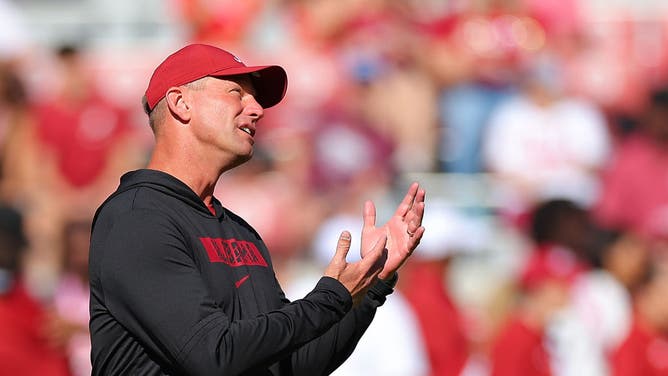SEC Clowns Itself Again With Indiana Criticism
Notre Dame's commanding win over the Indiana Hoosiers on Friday night set off a firestorm of SEC superiority, from a conference that loves to hold other teams to standards theirs can't live up to.
The most obvious example is Ole Miss head coach Lane Kiffin, who ignored his own team's three terrible losses to unranked teams to criticize the College Football Playoff committee.
READ: Lane Kiffin Mocks Indiana For Pathetic Performance Against Notre Dame
But it's not just Kiffin; the entire SEC-based internet lost its collective mind on Saturday morning, demanding that a three-loss Alabama team, or a three-loss Ole Miss team should have been rewarded for their mediocre seasons. It's not surprising, but it is objectively anti-reality. And it's yet another example of how the SEC is more than happy to ignore inconvenient stats when it benefits them.
For example, Kirk Herbstreit, who works for the SEC's media network, said on College GameDay Saturday morning that Indiana didn't belong on the field against Notre Dame. Indiana had a poor offensive showing on the road against arguably the best defense in the country. Alabama meanwhile, the team that so obviously deserved to get in because of its inherent superiority, was worse on the road against a mediocre 6-6 Oklahoma team.
But that's just one example, and advanced stats have even more humble pie to serve up to SEC supremacists.

TUSCALOOSA, ALABAMA - OCTOBER 12: Head coach Kalen DeBoer of the Alabama Crimson Tide looks on prior to facing the South Carolina Gamecocks at Bryant-Denny Stadium on October 12, 2024 in Tuscaloosa, Alabama. (Photo by Kevin C. Cox/Getty Images)
Texas Not Subject To Same Criticisms As Other Schools, Weirdly
Joel Klatt on Saturday morning brought up on X that Texas, by the standards of the SEC's media partners on ESPN, also had a very weak resume. Texas didn't have a single win over a team that finished the 2024 season ranked, and lost twice to the only currently ranked team they played.
Somehow, there's been no discussion or criticism over whether they belong.
But those are anecdotes. And thankfully, we have a more objective way to measure how good a team's record actually was.
An advanced stats ranking system called FEI has a "Strength of Record" metric, where teams are ranked based on the expected record an elite team would have against their schedule. Effectively, if a generically elite team played the same schedule Texas or Indiana played, how many games would they be expected to win?
Here's how the teams ranked in the latest update:
- Oregon
- Georgia
- Indiana
- Notre Dame
- Ohio State
- Penn State
- Boise State
- Texas
- Tennessee
- BYU
- SMU
- Army
Notice who isn't on that list? Alabama and Ole Miss. See where Texas ranks compared to Indiana? Not a great look for the SEC now, is it?
Here's how the teams strength of schedule lined up:
- Notre Dame - #46
- Texas - #31
- Ole Miss - #34
- Indiana - #42
- Alabama - #25
Those are all fairly close. Yet Indiana lost one game, Alabama and Ole Miss lost three. And Texas' schedule is only that ranked that high because they had to play Georgia twice. One SEC commentator even said that teams without a ranked win shouldn't get into the playoff. Which, as previously mentioned, would have kept Texas out. That certainly would have gone over well with the SEC's spoiled children fanbase.
The SEC is undefeated in hypothetical games, loves to talk about how Vegas would have favored their team over others, then ignores the very same analytics that Vegas uses to set lines, when those analytics show their schedules and records weren't actually that impressive.
But consider another hypothetical: if an SEC team with Indiana's resume had lost out to a three-loss Big 10 team, SEC fans would have melted into a puddle before reforming to stage a mass protest outside the College Football Playoff committee's offices. Then melted back down into another puddle.
The SEC just can't handle or accept the reality that Bama and Ole Miss did not belong in the playoff this year. Regardless of how the playoff games look, the performances from those two teams over the course of the season did not justify inclusion. And dealing with disappointment in this case means relentlessly clowning themselves by ignoring standards if they apply to them.